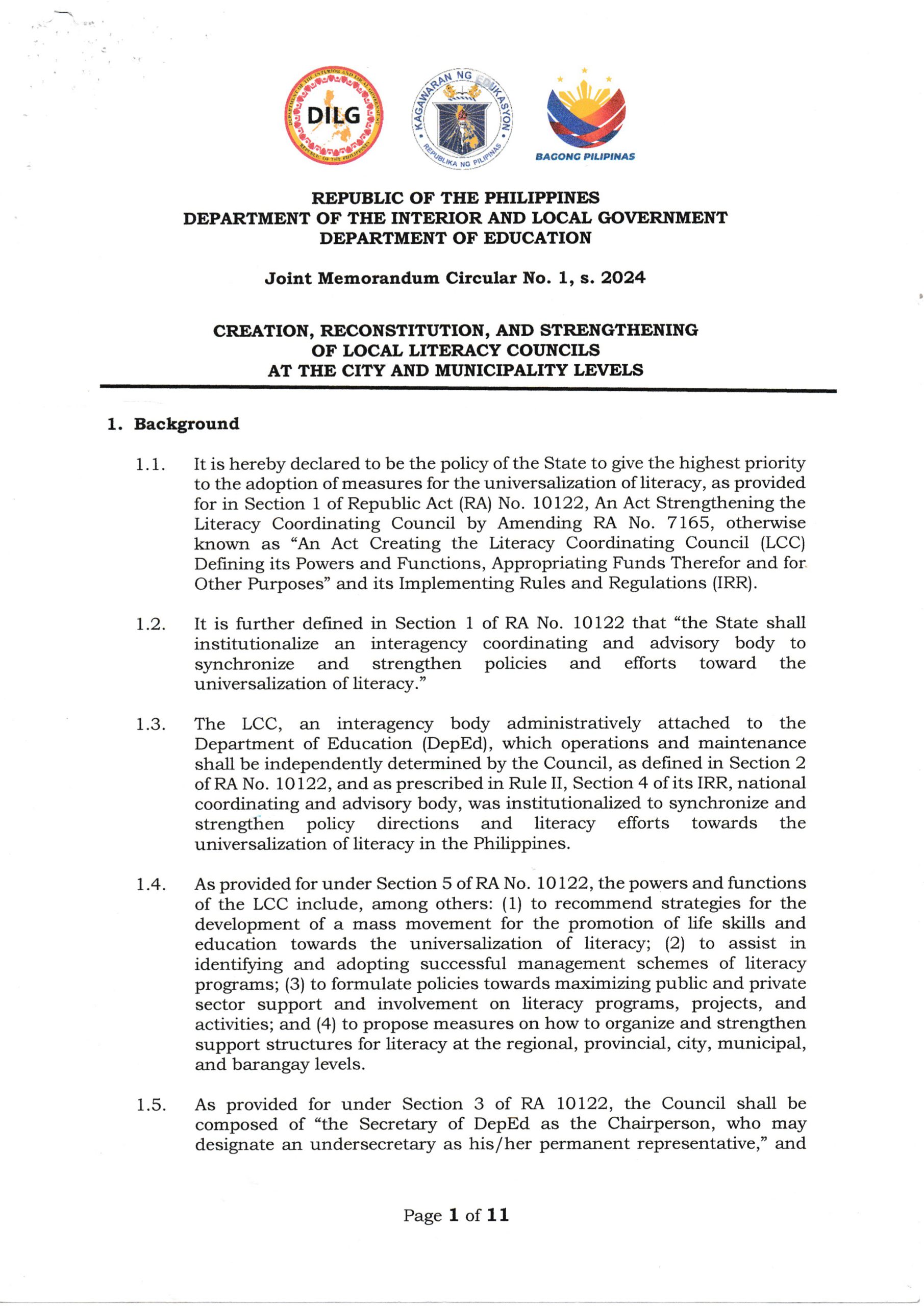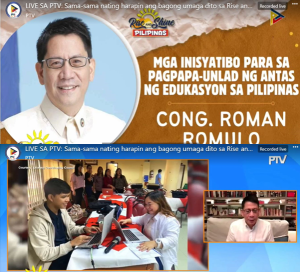DepEd, DILG Reinforce Creation of Local Literacy Councils in LGUs
Pasig City, Philippines – As part of their continued effort to support the Literacy Coordinating Council’s (LCC) mandate to boost literacy efforts across the country, the Department of Education (DepEd), under the leadership of Secretary Sonny Angara, and the Department of the Interior and Local Government (DILG), headed by Secretary Juanito Victor C. Remulla, officially signed Joint Memorandum Circular No. 1, Series of 2024, titled “Creation, Reconstitution, and Strengthening of Local Literacy Councils at the City and Municipal Levels”.
The JMC, which took effect on February 27, 2025, provides key guidelines and procedures in creating, reconstituting, and strengthening Local Literacy Councils (LLCs) at the city and municipal levels. It also enumerates the roles and responsibilities of DILG and DepEd in the establishment of LLCs, and outlines the LLCs’ powers and functions.
All local government units (LGUs) nationwide are enjoined to establish or strengthen their own LLC in line with the guidelines set forth in the JMC.










 The Literacy Coordinating Council (LCC) Blueprint for Action is an action program for the attainment of the Philippines’ literacy goal: universalization of literacy in the country. The first Blueprint for Action was crafted in 1996 and officially adopted in 1997 through Administrative Order No. 324 (1997). It was formulated not only to serve as LCC’s strategic framework in developing policies and implementing programs towards eradication of illiteracy, but also to guide the Council’s other concerned entities such as other government agencies, local government units, and partners from civil society groups, among others.
The Literacy Coordinating Council (LCC) Blueprint for Action is an action program for the attainment of the Philippines’ literacy goal: universalization of literacy in the country. The first Blueprint for Action was crafted in 1996 and officially adopted in 1997 through Administrative Order No. 324 (1997). It was formulated not only to serve as LCC’s strategic framework in developing policies and implementing programs towards eradication of illiteracy, but also to guide the Council’s other concerned entities such as other government agencies, local government units, and partners from civil society groups, among others. The Literacy Coordinating Council recently held its National Literacy Conference in Imperial Palace Suite, Timog Avenue, Corner Tomas Morato Avenue, Quezon City, on September 27-29, 2011. The Conference, with the theme “Pursuing Community Development through Peace Literacy” was participated in by local government units officials, DepEd Alternative Learning System officials and teachers, non-government organizations representatives, Council representatives and technical advisory and working groups, and literacy stakeholders and advocates from all over the Philippines. Around 417 registered participants filled the Hall of the Imperial Palace Suite, excluding the LCC Secretariat and working committees Honored guests and speakers to the Conference included DepEd Undersecretary Rizalino Rivera as the keynote speaker, and Philippine Information Ageny Director General, Atty. Jose A. Fabia, among others.
The Literacy Coordinating Council recently held its National Literacy Conference in Imperial Palace Suite, Timog Avenue, Corner Tomas Morato Avenue, Quezon City, on September 27-29, 2011. The Conference, with the theme “Pursuing Community Development through Peace Literacy” was participated in by local government units officials, DepEd Alternative Learning System officials and teachers, non-government organizations representatives, Council representatives and technical advisory and working groups, and literacy stakeholders and advocates from all over the Philippines. Around 417 registered participants filled the Hall of the Imperial Palace Suite, excluding the LCC Secretariat and working committees Honored guests and speakers to the Conference included DepEd Undersecretary Rizalino Rivera as the keynote speaker, and Philippine Information Ageny Director General, Atty. Jose A. Fabia, among others.